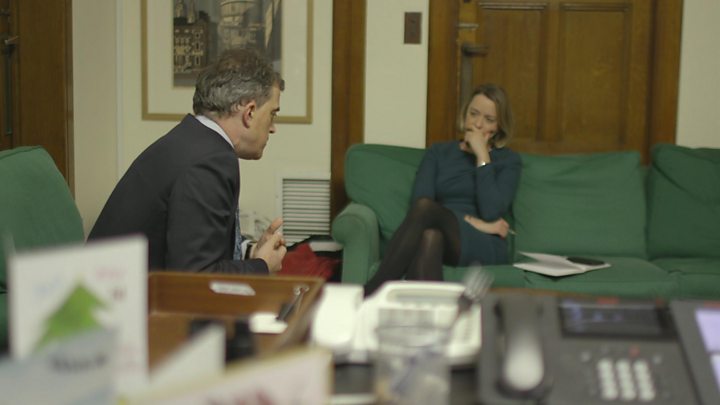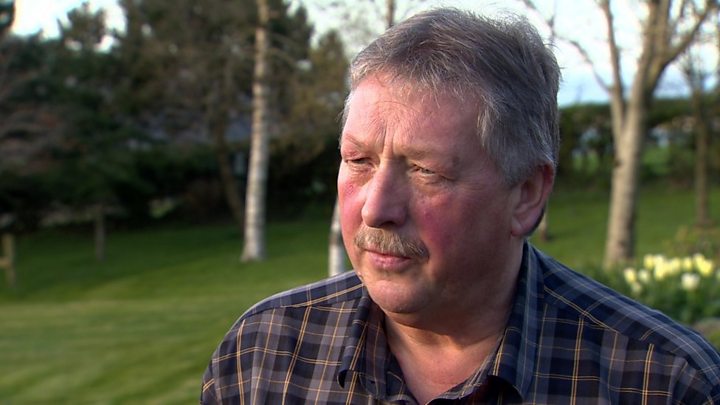The government should have made clear after the 2017 election that it would "inevitably" have to accept a softer Brexit, the Tory chief whip has said.
1 April 2019 6.00am
In a BBC documentary, Julian Smith is also strongly critical of the cabinet's behaviour and lack of discipline.


It is unprecedented for a chief whip to publicly attack his own government and comes as the cabinet is deeply split over whether to move to a softer deal.
MPs hold further indicative votes later on options to resolve the deadlock.
A customs union with the EU is thought to be the most popular of the ideas under consideration.
In interviews for The Brexit Storm: Laura Kuenssberg's Inside Story, Mr Smith who, as chief whip, is responsible for maintaining discipline within the Conservative Party, accused ministers of trying to undermine the prime minister.
He said he witnesses ministers "sitting around the cabinet table... trying to destabilise her [Mrs May]" and described their behaviour as the "worst example of ill-discipline in cabinet in British political history".
Mr Smith said that when it failed to get a majority in the 2017 election, "the government as a whole probably should have just been clearer on the consequences of that. The Parliamentary arithmetic would mean that this would be inevitably a kind of softer type of Brexit."



Julian Smith has told the BBC that the government ought to have admitted after the election that it would inevitably have to move to a softer Brexit, saying ministers should have been clearer about the consequences of losing their majority then.
But here's the tricky thing - the prime minister has never acknowledged publicly that she might have to soften up her deal. And many Conservatives, including some in cabinet, believe it would be unacceptable to do so.
Mr Smith, and others in government, suggest the prime minister might still put her deal back in front of MPs, perhaps as early as this week. Whips are, hypothetically, the keepers of secrets inside government. But in these turbulent times, few conventions still apply.

European Commission President Jean-Claude Juncker said that patience was running out with the UK.
In an Italian television interview, Mr Juncker said that the EU wanted to see MPs reach an agreement about the terms of the UK's departure in the coming hours and days.
Although European leaders agreed a withdrawal deal with Mrs May, Parliament has rejected it three times.
What next?
- Monday, 1 April: MPs hold another set of votes on Brexit options to see if they can agree on a way forward
- Wednesday, 3 April: Potentially another round of so-called "indicative votes"
- Wednesday, 10 April: Emergency summit of EU leaders to consider any UK request for further extension
- Friday, 12 April: Brexit day, if UK does not seek/EU does not grant further delay
- 23-26 May: European Parliamentary elections
Mrs May's deal is opposed by parties including Northern Ireland's DUP - which the government relies upon for support - as well as a group of her own MPs.
The DUP has said it will not vote for the deal as it believes it could threaten Northern Ireland's place in the UK.
The party's Brexit spokesman, MP Sammy Wilson, said it would not back it even if Mrs May brings it for a vote in the Commons "1,000 times".

The prime minister has until 12 April to seek a longer extension to the Article 50 process if the UK is to avoid leaving without a deal.
A petition to revoke the Article 50 notification and cancel Brexit reached 6 million signatures on Sunday.
MPs will hold their second non-binding vote later on a series of options to see if any of them can command a majority in Parliament.
The prime minister has until 12 April to seek a longer extension to the Article 50 process if the UK is to avoid leaving without a deal.
A petition to revoke the Article 50 notification and cancel Brexit reached 6 million signatures on Sunday.
MPs will hold their second non-binding vote later on a series of options to see if any of them can command a majority in Parliament.
- How could Brexit be delayed?
- How could another Brexit referendum work?
- No deal - how are EU countries preparing?
None of MPs' eight proposed options secured a majority in the first set of indicative votes on 27 March, but those which received the most were a customs union with the EU and a referendum on any deal.
A customs union would allow businesses to move goods around the EU without tariffs - taxes on importing goods - but membership would bar the UK from striking independent trade deals after Brexit.
Labour's deputy leader Tom Watson said there was an "emerging consensus" among Labour MPs that any deal had to be backed with another referendum.
He said: "Whatever the deal looks like - and we understand there has to be compromises - if it's underpinned by a People's Vote, that is the way we can bring the country back together."
Shadow foreign secretary Emily Thornberry also said "it looks like the time may come" for Labour to attempt another no confidence vote in the government.
If passed, this would pave the way for a general election, but Mr Gauke said he did not see that it would resolve the current deadlock.
Meanwhile, former prime minister John Major has called for a cross-party national unity government to be formed for a limited time to "take decisions without the chaos that we're seeing in Parliament".
The Brexit Storm: Laura Kuenssberg's Inside Story will be broadcast on Monday 1 April at 21:00 BST on BBC2